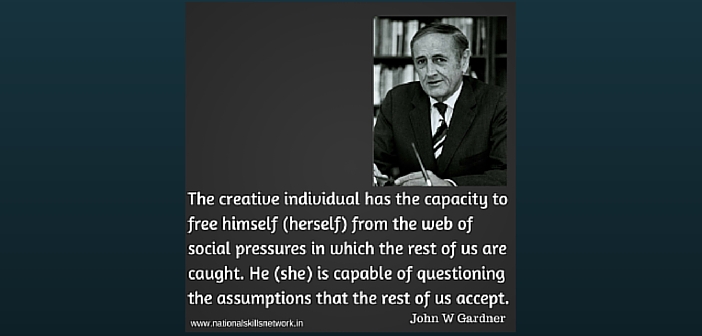Thanks to Mr. Narayana Murthy’s passionate exhortation to the graduates at IISc in his recent convocation speech, the need for indigenous invention with native talent, innovation on one’s home turf and similar concerns have come into the limelight. True, India may not have come up with earth shaking invention for ages and the reasons for it are apparently many. Mr. Murthy was voicing his concerns with the scientific community and institutionalized research. True, in India most research doesn’t get applied, productized, packaged and marketed well like in the Universities of the USA. However, there’s huge scope for skill-based inventions and innovations in the not-so-privileged, marginalized sections of society that need to be encouraged and supported. Let’s figure out the 5 ways skill development connects ‘Make in India‘ with invention and innovation.

Should proverbial necessity be the mother of all invention?
Should all invention be need driven? How is the need identified? Who creates it? How is it perceived? Does it come from the industry? There might have been small, local inventions in pockets of India, are they recognized and encouraged? Why always look up to the formal higher education system to produce earth shattering stuff? Can we not drive our efforts at other sections of society, mostly deprived of opportunities but not short of being inquisitive, bold and adventurous?
‘Making’ and ‘creating’ are closely related to innovation
Make in India, at the basic level may mean executing manual tasks and ensuring that the assembly line moves smoothly. But, it should not stop there. Nothing stops us from extending ourselves to the R&D levels, in fact, grounded experiences can contribute a wealth of patents in product design and development.
Knowledge alone will not help, skills+knowledge does
Formal education makes us rigid in many ways: we become conscious about its canonical ways of operation, we always want to meet the standards, we get carried away by theories with little time to see the practical value of what we learn. When we focus on skills, automatically our learning gets balanced with the execution of theory.
Research for its own sake?
Research, the way it is perceived in most Indian universities, is a goal in itself. The intellect is often in conflict with the masses, the mundane and the practical – at least this is how theory is made to get overrated. New knowledge gets created without much thought and action about how to apply it to solve our problem, improve our life and living; there’s hardly any effort at research marketing.
Anchoring role of skill development
Identifying talent in less privileged sections that could not afford higher education, dropouts who have dared to think and do differently, school leavers who preferred to be entrepreneurs – this is another avenue to scout for inventions and innovations that are powered by the skills they’ve picked up, honed and nurtured. So what, if they’ve not qualified formally for institutional certification!
Skill Development is all about making ideas work by striving for excellence. It’s also the underlying message of ‘Make in India‘ campaign. When we’re skilled we can perform well and distinguish ourselves in our jobs. Skilling is also about knowing how to do your best, and deliver the on time with high quality and consistency. How about extending our skills to the realm of innovation and invention by thinking differently, doing boldly and achieving remarkably!












